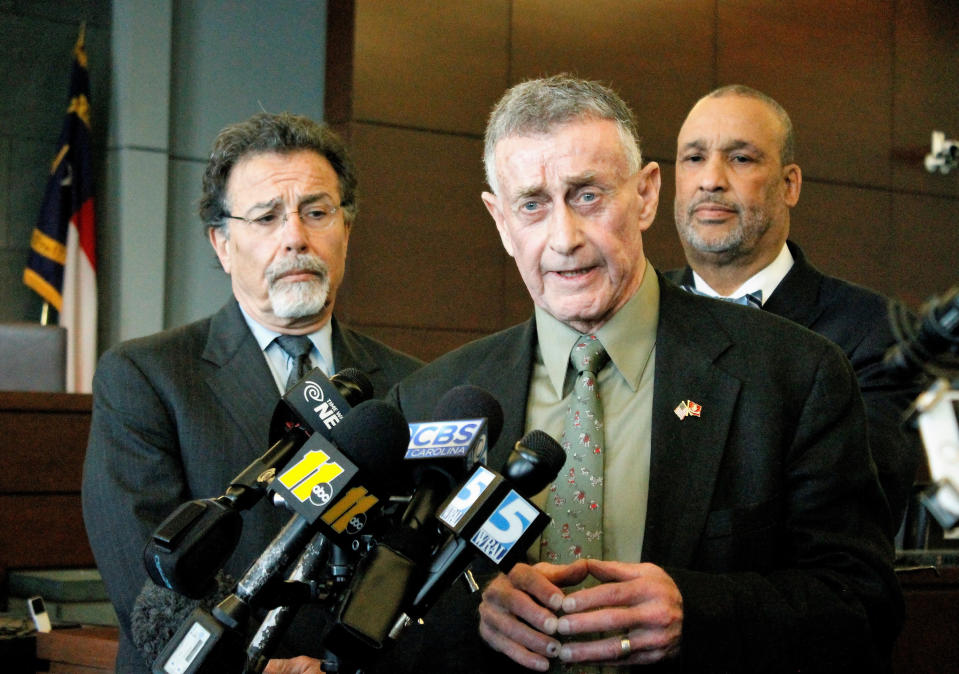Michael Peterson’s murder trial and subsequent appeals have been the subject of true crime documentaries and podcasts for more than 20 years, but this week, Peterson appeared as a podcast guest for the first time ever, discussing his case and maintaining his innocence in the 2001 death of his second wife, Kathleen Peterson.
Kathleen Peterson was found at the bottom of the stairs in the couple’s Durham, N.C. home, sparking a debate about whether she was murdered or fell. In 2003, Peterson was tried and convicted of her murder and served more than nine years in prison while exhausting his appeals. In 2011, after it was determined that North Carolina State Bureau of Investigation bloodstain analyst Duane Deaver gave false and misleading testimony against Peterson, he was released on house arrest to await a new trial.
Peterson asked that the re-trial be dismissed, but the request was denied and a new trial scheduled. In 2017, before the trial began, he opted for an Alford plea — a guilty plea that’s entered because sufficient evidence exists to convict, but with the defendant maintaining innocence. Upon entering an Alford plea for voluntary manslaughter, Peterson was sentenced to a maximum of 86 months in prison. Because he had served that time and more, he was released and faced no further prison time.
Peterson’s case became well-known thanks to The Staircase, a French documentary Peterson allowed to be filmed during his trial that was broadcast on Netflix, among other networks.
Now nearly 79, Peterson opened up about his experience with the judicial system on the Wrongful Conviction podcast, where he chatted with the attorney who represented him during his legal battle, David Rudolph, and Sonya Pfeiffer, an attorney who worked as a reporter covering the Peterson case in its heyday. In the podcast, Peterson credits The Staircase documentary with helping him be released from prison.
“I knew this was going to be terrible,” Peterson tells Yahoo Entertainment of his feelings leading up to the trial. “When I heard about this film crew from France, I thought, ‘I want somebody to document this’ because I did not under any circumstances trust the police or the judicial system in Durham.”
“I honestly think that film is the main reason I got out of prison,” he adds, “because when it came out that Duane Deaver had been lying in other trials, there I was and [the documentary showed] this absolutely devastating film of him lying on the stand. When [the judge] saw that, he overturned my case.”
But Peterson feels differently about other depictions of his case, especially the HBO Max miniseries The Staircase starring Colin Firth and Toni Collette. In the companion podcast for the series, journalist Nancy Miller, who hosts the podcast, clarifies that “no one, including those who lived, it can say for sure what happened” to Kathleen Peterson, adding that showrunners Antonio Campos and Maggie Cohn “added on [an] extra layer of story.” Still, Peterson feels the series has done more harm than good for himself and his four adult children.
“It’s been tragic to my family,” he says. “[The documentary] was fine because we were filmed and it was our own story, but the HBO thing is total fiction. I watched maybe a minute of the trailer when it first came out and I saw everybody screaming at each other and I thought Who’s this? What family is this?”
“My family has been absolutely appalled at what Antonio Campos did — taking real people and fictionalizing their lives — which was ethically wrong and totally exploitative,” he adds. “That thing was just hideous. It’s just a piece of trash and I’m very upset about it. It’s been an abomination … he just trashed our lives.”
The Wrongful Conviction podcast is co-hosted by Jason Flom, a criminal justice reform advocate and founding board member of the Innocence Project. Flom says “when it’s working in a way that is actually positive and true,” the true crime genre can be beneficial, citing the Serial podcast and its role in the recent overturning of Adnan Syed‘s conviction in the 1999 killing of Baltimore teen Hae Min Lee, as an example.
“Adnan Syed was fully exonerated,” says Flom. “He’s been declared actually innocent … because of the podcast. Obviously it took a wonderful legal team, but without the podcast I don’t think anybody debates that he would be in prison today and probably spend the rest of his life there.”
For that reason, Flom says the true crime genre isn’t all bad. Peterson agrees, sharing he remembers watching the television show Law and Order for the same reasons people are drawn to true crime today.
“It can’t be helped, it’s just there,” he says. “Kathleen and I were fascinated by Law and Order and they denied it, but [the episodes] were all based on true crimes. There’s no question … writers weren’t that ingenious, they were taking their stories from real life and changing a little bit about it.”
“And then it’s like Now we have the real thing: sex, money and murder: The Michael Peterson case,” he continues. “And so, instead of watching some fictionalized account, we see the real thing happening. And that spawned other real-life programs … it’s just a tragedy that there’s this great appetite that people have for sex, murder and money. It’ll never go away now, it’s just a part of our culture.”
So how can true crime fans know if the content they’re consuming is accurate or a dramatic interpretation? Sonya Pfeiffer, who co-hosts the Abuse of Power podcast, says that “it can be hard to figure it out.”
“The HBO series is a perfect example of why it’s so challenging,” she says, “because it’s based on true events … if that’s what you watch, you probably believe that’s the truth.”
“What people have to do is be curious enough to research on their own,” she adds. “Michael is not alone in being distorted by popular media, because there is always a look for the thing that’s gonna hook someone … really, it’s a matter of individual curiosity and do you have the time and inclination to look for the truth?”
She also says to consider the source, again referencing The Staircase miniseries. “This is HBO — but maybe then you go and Google a true documentary.”
Peterson says it’s also important to do your homework before deciding whether you believe someone is guilty or innocent. “It’s the educational aspect I think’s so important,” he says, “because 25 years ago, if the police arrested someone, we thought Oh, they’re guilty, no question, but we don’t believe that anymore. We know the police make mistakes.”
“I was a rich white guy and I became a victim,” he adds. “[Being wrongfully convicted] can happen not just to the poor, not just to Blacks, but it can happen to anybody … we’ve been educated now to know the justice system isn’t necessarily just, bad things do happen to good people and people are convicted who are innocent. I didn’t particularly want to be the poster boy for this thing, but now, I’m more than happy to say to people that this could happen to them.”
Pfeiffer says there are ways to help prevent miscarriages of justice. “One thing you can always do is educate yourself about the races you don’t think are important in your local jurisdiction,” she shares, “whether it’s district attorneys, whether it’s judges. People know nothing about people who are elected as D.A.’s and judges, but these races matter because they set the tone for criminal justice in a community.”
“The more you take in and consume these kinds of entertainment, it’s also important to educate yourself and ask What happened here?” she adds. “If people really open up their minds to what they are hearing, they will act.”
She also says to stop trying to shirk jury duty. “Don’t get out of jury selection,” she urges. “If you have a sense of knowledge about the system, serve on a jury.”
Peterson says that today, he spends his time writing. He’s written two books about his case, Behind the Staircase and Beyond the Staircase, and is currently working on a new project. “My day is taken up with writing,” he says, “and I exercise a lot — I do five miles in the woods every day.”
“It’s peaceful and it’s lovely and it keeps me in shape … at least a little bit,” he says. “If I go to the gym, everybody wants to talk about [the case], but I don’t want to talk about it, so I go in the woods and I’m all by myself and I can have some peace and quiet.”




